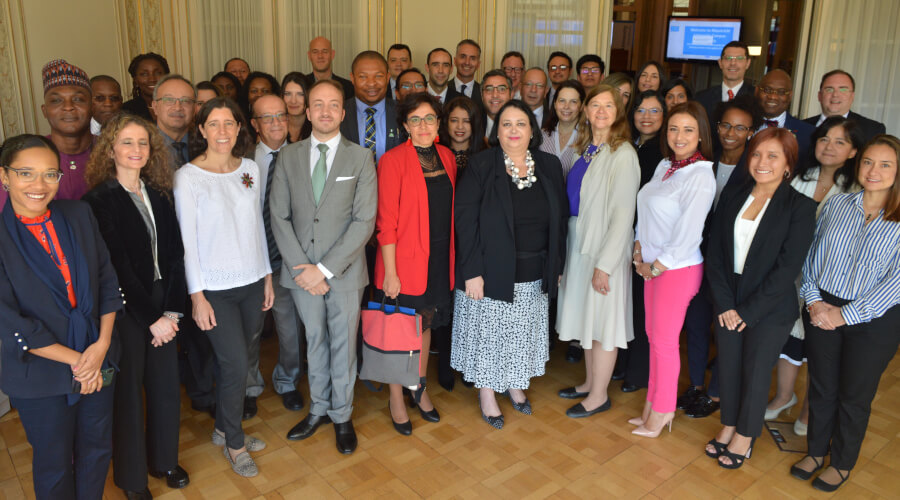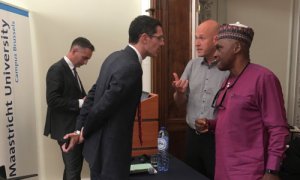Thanks to the collaboration of Maastricht University, EUROsociAL+ and GIZ, the CIAT International Taxation Network held its third meeting

The CIAT, along with the German Cooperation (GIZ), EUROsociAL+ and Maastricht University hosted the third meeting of the International Taxation Network in Brussels, Belgium from September 2nd to 5th, 2019.
The International Taxation Network is a sphere through which all the actors related to CIAT in matters of international tax, both from public or private sectors, have the opportunity to present their experiences, discuss proposals and follow-up the ongoing initiatives of the Network. In the framework of the Network meeting, CIAT’s Executive Secretariat reports on the progress made during the previous year and the support provided to its member countries through various work modalities. It is also a space for reflection and discussion of issues that constitute priorities for the fiscal agenda of many countries.
The Network included open sessions with representatives from the private sector and closed sessions with representatives from the public sector, universities and NGOs. Participants of the event comprised of representatives from 21 CIAT member countries (15 Latin American and Caribbean countries, 4 African countries, 1 North American and 1 European Union country). As well as 4 international organizations (IGF, OECD, OXFAM, and TJN), 3 universities (Maastricht University, Externado University of Colombia and Leiden University), 4 companies from the private sector (EY, FCI Net, Orbitax, Royalty Range) and 2 boutique law firms.

A large variety of subjects were presented and discussed starting with the work that stemmed from previous meetings of the Network such as the CIAT BEPS Monitoring Database[1], the update and additions to the Transfer Pricing Database[2] and other technical assistance projects. The authors of ‘A Cocktail of Measures for the Control of Abusive Transfer Pricing Manipulation with a Contextual Focus on Low-Income and Developing Countries’ (CIAT, 2019) outlined how this document could be a useful tool for filling the inevitable gaps observed by countries in transfer pricing legislations. Potential opportunities were presented to countries wishing to further their development efforts through the EUROsociAL+ Program. Tax professionals further explained the most recent technical developments and proposals such as the digitalization of the economy, the new Article 12A and BEPS 2.0. Tools for combating evasion and avoidance were showcased in the presentations on anti-abuse rules, financial secrecy, tax incentives, information availability and international cooperation experiences. The closed sessions focused more on practical country experiences relating to the cases reported by the tax administrations in the ‘Transnational Cases Involving the Erosion of the Taxable Base’ project. In this regard, CIAT and Maastricht University presented the progress of this initiative whose objective is to facilitate discussion and identification of tax planning schemes, non-compliance risks and potential solutions by creating a database of juridical cases. Moreover, representatives from the OECD elaborated on the latest issues dealt with by the ‘Platform for Collaboration on Tax’ and presented toolkits for facilitating transfer pricing concerns in documentation, mineral pricing, comparables, adjustments, etc. Lastly, countries were presented the opportunity to test a tool that is in the final stages of construction by the OECD. This tool is meant to improve the legibility of the CbC Report and its potential use as a risk assessment tool (for exchanges in XML format).

CIAT, Gonzalo Arias; Tax Advisor, Gianmarco Cottani; Tax Justice Network, Markus Meinzer; Nigeria, Fred Femi Akinfala
Additionally, CIAT, Royalty Range and FCInet presented their databases for tax investigations and audits: DIP is a CIAT tool that facilitates access to public information, useful for control purposes. Royalty Range presented its products and offered free access to its databases to selected CIAT member countries, who meet certain conditions. FCInet has a powerful tool oriented towards investigating financial crimes that promises to be beneficial for tax administrations.
There is no doubt that fruitful discussions were alight, helping to lead us further down the path for development and growth in the international tax arena. We thank all the members of the Network for their active participation in CIAT initiatives and especially those who provide the funds to materialize these efforts.
[1] More information regarding this initiative is available at: https://www.ciat.org/beps-monitoring-database/?lang=en.
[2] This database is available at https://www.ciat.org/transfer-pricing/?lang=en.
5,181 total views, 4 views today
